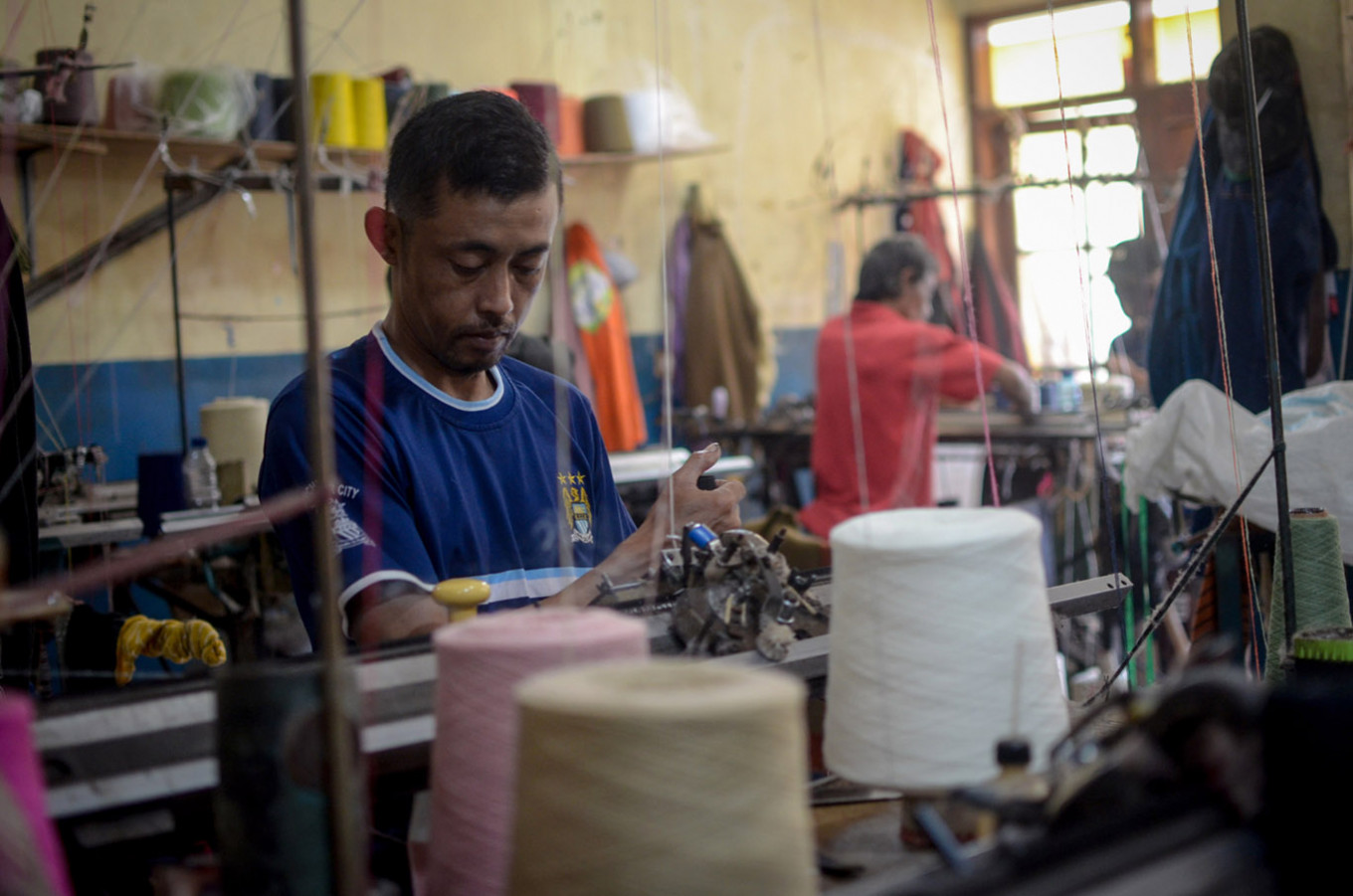Govt delays import reduction deadline amid COVID-19
Industry Minister Agus Gumiwang Kartasasmita told journalists that the ministry had decided to delay the deadline to reduce imports by 35 percent from 2021 to 2022.
Change Size
 Workers produce knitwear at the Rajong Binong Jati Center, Bandung, West Java, on March 6, 2020. (Antara/Raisan Al Farisi)
Workers produce knitwear at the Rajong Binong Jati Center, Bandung, West Java, on March 6, 2020. (Antara/Raisan Al Farisi)
T
he Industry Ministry pushed back the deadline to achieve its import reduction target by a year, as the COVID-19 pandemic has battered productivity and demand of industries, a government official said.
Industry Minister Agus Gumiwang Kartasasmita told journalists that the ministry had decided to delay the deadline to reduce imports by 35 percent from 2021 to 2022.
“There needs to be an adjustment of our import reduction target because market demand has slumped. COVID-19 has also reduced factories’ productivity,” he said at a press event on May 27.
Agus said the ministry was also currently coordinating with other ministries to establish a comprehensive road map to reach the target.
The country recorded a US$3.2 billion trade deficit in 2019, with imports totalling $170.72 billion, Statistics Indonesia (BPS) data show.
Seven industry sectors are prioritized for the import reduction program to better the country’s trade figures, including the automotive industry, textiles, food and beverages, electronics, petrochemicals, medical equipment manufacturing, and pharmaceuticals.
However, the program was hampered by the current low industrial capacity utilization, which is a measure of productivity, as it stands at around 25 to 30 percent of its maximum capacity as a result of the pandemic.
The large-scale social restrictions (PSBB) enforced by the government to contain the COVID-19 pandemic have also affected the productivity of the manufacturing industry, as factories have to limit on-site workers to maintain physical distance.
“Even with the ‘new normal’ scenario, the maximum number of workers on site is limited to 50 percent to ensure that the workers can adhere to physical distancing rules. Such a state of affairs ultimately affects the productivity of our industries,” the minister said.
Currently, manufacturers are allowed to operate as long as they can obtain operational and mobility permits (IOMKI) from the Industry Ministry. The ministry has issued 17,000 IOMKI for various companies since the Health Ministry’s regulation took effect, Agus added.
Indonesia’s imports fell for a 10th consecutive month in April as manufacturing companies cut production output while consumer demand continues to shrink amid the COVID-19 pandemic, signaling cooling economic activity going forward.
The country recorded US$12.54 billion in imports in April, an 18.58 percent drop from the same period last year.
In response to the minister's statement, Toyota Motor Manufacturing Indonesia’s (TMMIN) corporate administration and external relations director Bob Azam told The Jakarta Post that he fully supported the government’s plan as import reduction could provide benefits for the industry.
“Reducing imports could also reduce dollar exposure in our industry, which could be problematic if the rupiah weakens,” he said in a phone interview on May 29.
According to BPS, the auto industry posted a trade surplus last year. Indonesia recorded $7.16 billion in imports and $8.16 billion in exports of vehicles and auto-parts in 2019.
Despite his full support, Bob said the country’s upstream industry, which the automotive industry heavily relies on, should be improved in order to increase effectiveness and reduce costs for carmakers.
“Our main priority is to ensure that the products align with the consumer’s purchasing power. If the local steel and petrochemicals industries can increase their competitiveness, it can drive down prices and we’ll gladly buy from them,” he said.
However, he cited that the pandemic's impact on the industry made it harder for carmakers to export vehicles and maintain a trade surplus in 2020.
Car sales have been severely hit by the COVID-19 pandemic, falling drastically by 90 percent year-on-year to 7,871 cars in April, the worst decline in decades, according to the Association of Indonesian Automakers (Gaikindo).









